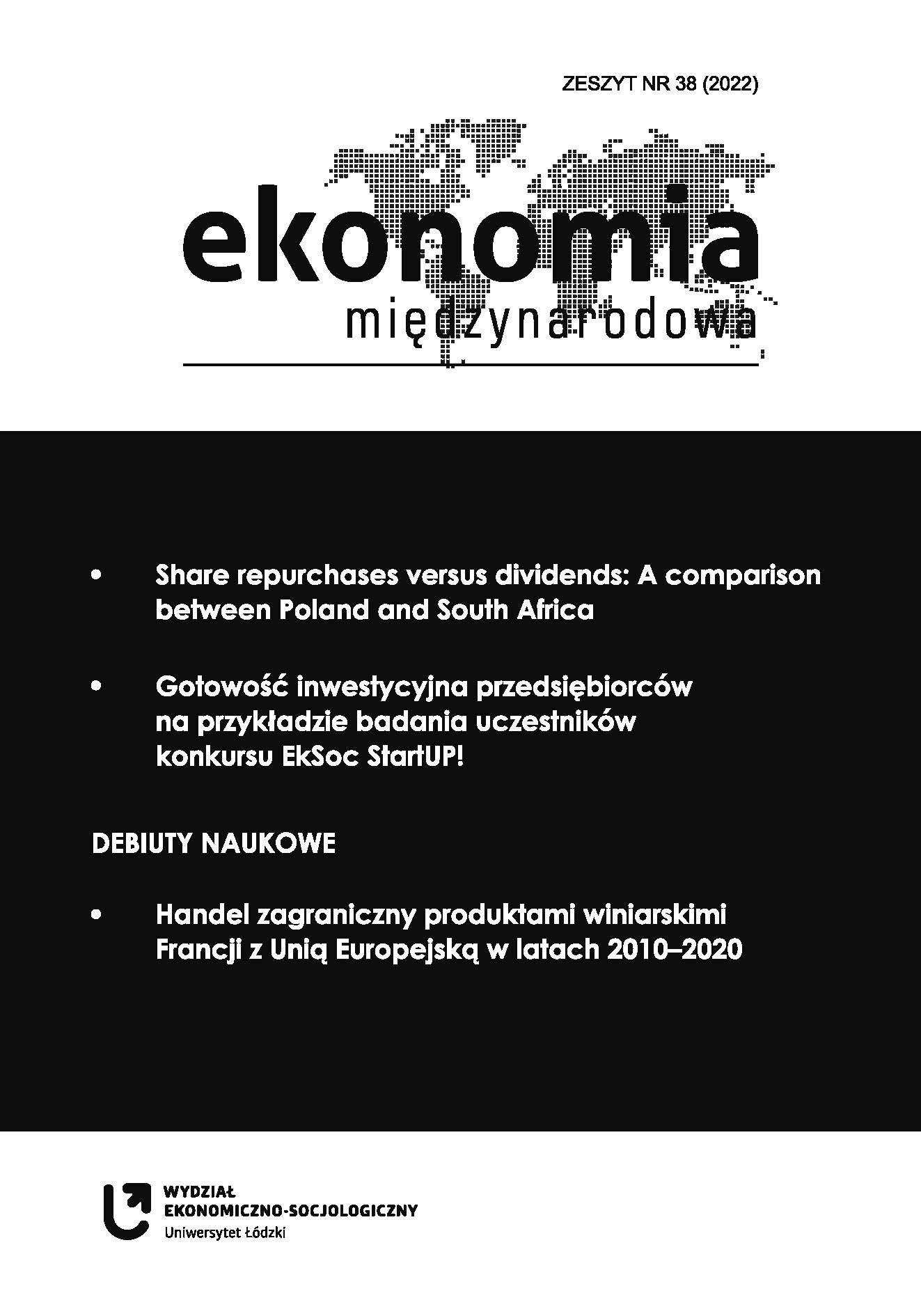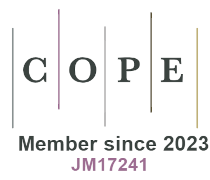Investment readiness of entrepreneurs on the example of a survey of participants of the EkSoc StartUP! Competition
DOI:
https://doi.org/10.18778/2082-4440.38.02Keywords:
investment readiness, entrepreneurs, start-upsAbstract
Investment readiness is a multidimensional phenomenon, encompassing a number of elements linked to a person of the entrepreneur. It is an important demand determinant of raising capital, including foreign capital, by companies in the early stages of development (seed and start-up), in particular from the broader venture capital market.
The purpose of the article was to identify the essence and attributes shaping investment readiness, and to examine the level of awareness of the phenomenon and its understanding among entrepreneurs. The definition of the phe-nomenon and its elements is based on an analysis of the world subject literature and research devoted to the topic under discussion. Additionally, the paper presents the results of a survey of entrepreneurs who are participants in the EkSoc StartUP! Competition. Both awareness of the phenomenon and the ability of companies in the early stages of development to build it increase the chance of raising capital for growth, including international expansion, which in the long term drives the growth of global economies.
References
Ali S., Berger M., Botelho T., Duvy J.N., Frencia Ch., Gluntz P., Delater A., Licht G., Losso J., Pellens M. (2017), Understanding the nature and impact of the business angels in funding research and innovation: Final report, ZEW-Gutachten und Forschungsberichte, Zentrum für Europäische Wirtschaftsforschung (ZEW), Mannheim, http://hdl.handle.net/10419/181907; https://search.ebscohost.com/login.aspx?direct=true&db=ed-soai&AN=edsoai.on1060158660&lang=pl&site=eds-live (data dostępu: 19.04.2022).
Google Scholar
Brush C.G., Edelman L.F., Manolova T.S. (2012), Ready for funding? Entrepreneurial ventures and the pursuit of angel financing, „Venture Capital”, 14(2), April–July, 111–129. https://dx.doi.org/10.1080/13691066.2012.654604
Google Scholar
DOI: https://doi.org/10.1080/13691066.2012.654604
Clark C. (2008), The impact of entrepreneurs’ oral ‘pitch’ presentation skills on business angels’ initial screening investment decisions, „Venture Capital”, 10(3), July, 257–279. https://doi.org/10.1080/13691060802151945
Google Scholar
DOI: https://doi.org/10.1080/13691060802151945
Doroszewski W. i in. (1958–1969), Słownik języka polskiego, hasło: gotowość, Warszawa.
Google Scholar
Douglas E.J., Shepherd D. (2002), Exploring investor readiness: Assessments by entrepreneurs and investors in Australia, „Venture Capital”, 4(3): 219–236. https://doi.org/10.1080/13691060213713
Google Scholar
DOI: https://doi.org/10.1080/13691060213713
EBAN (2010), White paper. Early stage investing: An asset class in support of the EU strategy for growth and jobs. A recipe for the EU to become one of the world’s most dynamic early-stage investment markets. October 2010, http://www.eban.org/wp-content/uploads/2014/09/21.-White-Paper-Early-Stage-Investing.pdf https://search.ebscohost.com/login.aspx?direct=true&db=edsoai&AN=edsoai.on1060158660&lang=pl&site=eds-live (data dostępu: 19.04.2022).
Google Scholar
EBAN (2018), Why business angels do not invest. Findings on obstacles preventing investment in startups, https://www.eban.org/eban-report-business-angels-not-invest/ (data dostępu: 15.02.2022).
Google Scholar
European Commission (2002), Benchmarking business angels. Final report, Enterprise Directorate General. Brussels, https://ec.europa.eu/docsroom/documents/3333/ (data dostępu: 15.02.2022).
Google Scholar
European Commission (2006), Investment readiness – Summary report of the workshop, Directorate-General for Enterprise and Industry. Brussels, https://ec.europa.eu/docsroom/documents/3327/ (data dostępu: 15.02.2022).
Google Scholar
GUS (2021a), Działalność przedsiębiorstw niefinansowych w 2020 r., Główny Urząd Statystyczny, Warszawa, https://stat.gov.pl/obszary-tematyczne/podmioty-gospodarcze-wyniki-finansowe/przedsiebiorstwa-niefinansowe/dzialalnosc-przedsiebiorstw-niefinansowych-w-2020-roku,2,17.html (data dostępu: 15.04.2022).
Google Scholar
GUS (2021b), Działalność innowacyjna przedsiębiorstw w latach 2018–2020, Główny Urząd Statystyczny, Warszawa, https://stat.gov.pl/obszary-tematyczne/nauka-i-technika-spoleczenstwo-informacyjne/nauka-i-technika/dzialalnosc-innowacyjna-przedsiebiorstw-w-latach-2018-2020,2,20.html (data dostępu: 15.04.2022).
Google Scholar
https://www.eksocstartup.uni.lodz.pl/ (data dostępu: 15.02.2022).
Google Scholar
Kaplan R.S., Norton D.P. (2004), The strategy map: Guide to aligning intangible assets, „Strategy & Leadership”, 32(5): 10–17. https://doi.org/10.1108/10878570410699825
Google Scholar
DOI: https://doi.org/10.1108/10878570410699825
Mason C., Botelho T., Zygmunt J. (2017), Why business angels reject investment opportunities: Is it personal?, „International Small Business Journal: Researching Entrepreneurship”, 35(5): 519–534. https://doi.org/10.1177/0266242616646622
Google Scholar
DOI: https://doi.org/10.1177/0266242616646622
Mason C.M., Harrison R.T. (2001), „Investment readiness”: A critique of government proposals to increase the demand for venture capital, „Regional Studies”, 35 (7), 663–668. https://doi.org/10.1080/00343400120075939
Google Scholar
DOI: https://doi.org/10.1080/00343400120075939
Mason C.M., Harrison R.T. (2002), Barriers to investment in the informal venture capital sector, „Entrepreneurship & Regional Development”, 14(3): 271–287. https://doi.org/10.1080/08985620210142011
Google Scholar
DOI: https://doi.org/10.1080/08985620210142011
Mason C.M., Harrison R.T. (2003), „Auditioning for money”: What do technology investors look for at the initial screening stage?, „Journal of Private Equity”, 6(2): 29–42. https://www.jstor.org/stable/43504257 (data dostępu: 25.04.2022).
Google Scholar
DOI: https://doi.org/10.3905/jpe.2003.320037
Mason C.M., Harrison R.T. (2004), Improving access to early stage venture capital in regional economies: A new approach to investment readiness, „Local Economy”, 19: 159–173. https://doi.org/10.1080/0269094042000203090
Google Scholar
DOI: https://doi.org/10.1080/0269094042000203090
Mason C.M., Kwok J. (2010), Investment readiness programmes and access to finance: A critical review of design issues, „Local Economy”, 25, 269–270. https://doi.org/10.1080/02690942.2010.504570
Google Scholar
DOI: https://doi.org/10.1080/02690942.2010.504570
Mason C.M., Stark M. (2004), What do investors look for in a business plan? A comparison of the investment criteria of bankers, venture capitalists and business angels, „International Small Business Journal”, 22(3): 227–248. https://doi.org/10.1177/0266242604042377
Google Scholar
DOI: https://doi.org/10.1177/0266242604042377
Maxwell A.L., Jeffrey S.A., Lévesque M. (2011), Business angel early stage decision making, „Journal of Business Venturing”, 26(2): 212–225. https://doi.org/10.1016/j.jbusvent.2009.09.002
Google Scholar
DOI: https://doi.org/10.1016/j.jbusvent.2009.09.002
Mikołajczyk B., Krawczyk M. (2007), Aniołowie biznesu w sektorze MSP, Difin, Warszawa.
Google Scholar
Myers S.C. (1984), The capital structure puzzle, „Journal of Finance”, 39(3): 575–592. https://doi.org/10.1111/j.1540-6261.1984.tb03646.x
Google Scholar
DOI: https://doi.org/10.2307/2327916
OECD (2015), New Approaches to SME and Entrepreneurship Financing: Broadening the Range of Instruments, OECD Publishing, Paris, http://dx.doi.org/10.1787/9789264240957-en (data dostępu: 19.04.2022).
Google Scholar
DOI: https://doi.org/10.1787/9789264240957-en
OECD (2016), Financing SMEs and Entrepreneurs 2016: An OECD Scoreboard, OECD Publishing, Paris, http://dx.doi.org/10.1787/fin_sme_ent-2016-en
Google Scholar
DOI: https://doi.org/10.1787/fin_sme_ent-2016-en
OECD (2020), Financing SMEs and Entrepreneurs 2020: An OECD Scoreboard, OECD Publishing, Paris, https://doi.org/10.1787/061fe03d-en
Google Scholar
DOI: https://doi.org/10.1787/061fe03d-en
Parhankangas A., Ehrlich M. (2014), How entrepreneurs seduce business angels: An impression management approach, „Journal of Business Venturing”, 29(4): 543–564. https://doi.org/10.1016/j.jbusvent.2013.08.001
Google Scholar
DOI: https://doi.org/10.1016/j.jbusvent.2013.08.001
PARP (2019), Raport Startupy w Polsce 2019, Warszawa, https://www.parp.gov.pl/storage/publications/pdf/Startupy-w-Polsce---raport-2019_200117.pdf (data dostępu: 15.03.2022).
Google Scholar
PARP (2020), Monitoring innowacyjności polskich przedsiębiorstw. Wyniki III edycji badania 2020, Warszawa, https://www.parp.gov.pl/storage/publications/pdf/Raport_Monitoring-innowacyjnoci-polskich-przedsibiorstw-III-edycja-2020.pdf (data dostępu: 15.03.2022).
Google Scholar
PARP (2021), Raport o stanie sektora małych i średnich przedsiębiorstw w Polsce 2021, Warszawa, https://www.parp.gov.pl/storage/publications/pdf/PARP-26_Raport-2021-07-22_WCAG_210726.pdf (data dostępu: 15.03.2022).
Google Scholar
Paul S., Whittam G., Johnston J.B. (2003), The operation of the informal venture capital market in Scotland, „Venture Capital”, 5(4): 313–335. https://doi.org/10.1080/1369106032000141931
Google Scholar
DOI: https://doi.org/10.1080/1369106032000141931
Silver L., Berggren B., Veghohn F. (2010), The impact of investment readiness on investor commitment and market accessibility in SMEs, „Journal of Small Business & Entrepreneurship”, 23(1): 81–95. https://doi.org/10.1080/08276331.2010.10593475
Google Scholar
DOI: https://doi.org/10.1080/08276331.2010.10593475
Sudek R. (2006), Angel investment criteria, „Journal of Small Business Strategy”, 17(2): 89–104, https://libjournals.mtsu.edu/index.php/jsbs/article/view/68 (data dostępu: 15.02.2022).
Google Scholar
Wiltbank R., Sudek R., Read S. (2009), The role of prediction in new venture investing, „Frontiers of Entrepreneurship Research”, 29(2): article 3. https://www.researchgate.net/publication/228871505_The_Role_Of_Prediction_In_New_Venture_Investing (data dostępu: 22.04.2022).
Google Scholar
Zana D., Barnard B. (2020), Venture capital and entrepreneurship: The cost and resolution of investment readiness, „IUP Journal of Entrepreneurship Devel-opment”, 17(4): 32–75. https://search-1ebscohost-1com-100000eb24065.han3.lib.uni.lodz.pl/login.aspx?direct=true&db=obo&AN=149483118&lang=pl&site=eds-live (data dostępu: 19.04.2022), http://dx.doi.org/10.2139/ssrn.3353078
Google Scholar
DOI: https://doi.org/10.2139/ssrn.3353078
Zoppa A., McMahon R.G.P. (2002), Pecking Order theory and the financial structure of manufacturing SMEs from Australia’s business longitudinal survey, „Small Enterprise Research”, 10(2): 23–41. https://doi.org/10.5172/ser.10.2.23
Google Scholar
DOI: https://doi.org/10.5172/ser.10.2.23
Downloads
Published
Versions
- 2023-06-01 (2)
- 2022-12-28 (1)
How to Cite
Issue
Section
License

This work is licensed under a Creative Commons Attribution-NonCommercial-NoDerivatives 4.0 International License.









